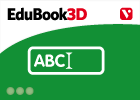Cargando...
Recursos educativos
-
Nivel educativo
-
Competencias
-
Tipología
-
Idioma
-
Tipo de medio
-
Tipo de actividad
-
Destinatarios
-
Tipo de audiencia
-
Creador
Lo más buscado
- País Vasco y Romanización
- Dictados para ortografía
- Contaminación acustica
- Globoflexia
- Ejercicios escolares para niños de 9 años
- Desarrollo emocional adolescencia
- Descargar ejercicios de ortografía
- Actividades acuáticas
- Graphic organizer
- Pocoyó
- Unidades númericas
- canciones inglés infantil
- Guía del cómic
- Manualidades infantiles para niños
- Múltiplos de 3
-

Identify. Trade and transport
EduBook Organización
- 2109 visitas
Match each definition with an aspect of transport: It has been developed especially within the context of the European Union. It is negative in Spain. It is in surplus thanks to tourism. Its…
-

Much / many (II)
EduBook Organización
- 2061 visitas
We usually use much and many in negative sentences, questions or sentences with too . A lot of The alarm was making a lot of noise. There were a lot of people. We can use a lot of with countable and…
-

Self-assessment T05 08 - The Hapsburg period
EduBook Organización
- 1777 visitas
Write the correct word for each definition: Bankers, merchants, artisans, doctors and lawyers belonged to this social group: . Powerful men who influenced the king's decisions but sometimes in a…
-

Some or any?
EduBook Organización
- 1587 visitas
“THERE ARE SOME STRAWBERRIES AND CHERRIES ON THE TABLE,” SAYS MARILLA. We use some in positive sentences and any in questions and negative sentences. “Are there any chocolate biscuits?” asks…
-

Few and little
EduBook Organización
- 1498 visitas
‘Few men had bright red hair like mine’ We use ‘few’ and ‘little’ to communicate a negative idea – to say ‘not much’ or ‘not many’. We use few with plural nouns and little with…
-

Question tags (I)
EduBook Organización
- 1473 visitas
Question tags ‘Go and buy it for me, will you?’ Scrooge says ‘will you’ at the end of the sentence to ask for agreement or confirmation from the boy. (‘Yes, I will’). This is a question tag.…
-

The imperative
EduBook Organización
- 1420 visitas
The imperative in English is the same as the infinitive of the verb, without ‘to’. In Chapter Seven, we saw these imperative sentences: Come with me! Please follow me! Please make him a knight. To…
-

Complete: some, any, a or an
EduBook Organización
- 1324 visitas
Some, any, a or an We use some in front of nouns in affirmative sentences We use any in front of nouns in questions We also use it in negative sentences We use a with singular nouns which begin with a…
-

Language - Understanding the text
EduBook Organización
- 1199 visitas
Look at the rules for using some and any. Then complete the sentences below. SOME (somebody, something, somewhere) generally used in affirmative phrases. I found some biscuits in the cupboard. ANY…
Te estamos redirigiendo a la ficha del libro...





